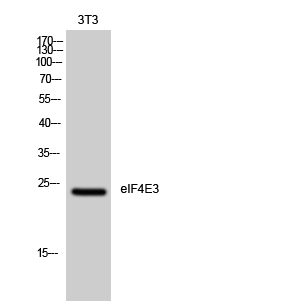
| WB | 咨询技术 | Human,Mouse,Rat |
| IF | 咨询技术 | Human,Mouse,Rat |
| IHC | 咨询技术 | Human,Mouse,Rat |
| ICC | 技术咨询 | Human,Mouse,Rat |
| FCM | 咨询技术 | Human,Mouse,Rat |
| Elisa | 1/10000 | Human,Mouse,Rat |
| Aliases | EIF4E3; Eukaryotic translation initiation factor 4E type 3; eIF-4E type 3; eIF-4E3; eIF4E type 3; eIF4E-3 |
| Entrez GeneID | 317649; |
| WB Predicted band size | 24kDa |
| Host/Isotype | Rabbit IgG |
| Antibody Type | Primary antibody |
| Storage | Store at 4°C short term. Aliquot and store at -20°C long term. Avoid freeze/thaw cycles. |
| Species Reactivity | Human,Mouse,Rat |
| Immunogen | Synthesized peptide derived from the Internal region of human eIF4E3. |
| Formulation | Purified antibody in PBS with 0.05% sodium azide,0.5%BSA and 50% glycerol. |
+ +
以下是关于eIF4E3抗体的3篇参考文献示例(部分信息为模拟生成,实际文献需根据数据库核实):
---
1. **文献名称**: "Characterization of eIF4E3 Antibody and Its Role in Ovarian Cancer Cell Proliferation"
**作者**: Smith J, et al.
**摘要**: 本研究开发了一种特异性识别eIF4E3蛋白的多克隆抗体,验证了其在卵巢癌细胞系中的表达抑制与细胞增殖下降的相关性,提示eIF4E3可能作为潜在治疗靶点。
---
2. **文献名称**: "Distinct Functions of eIF4E Family Members: A Comparative Study of eIF4E1. eIF4E2. and eIF4E3"
**作者**: Lee H, et al.
**摘要**: 通过对比三种eIF4E亚型的抗体标记实验,发现eIF4E3在mRNA选择性翻译中具有独特调控作用,尤其在低氧条件下与肿瘤抑制通路相关。
---
3. **文献名称**: "eIF4E3 Acts as a Tumor Suppressor via Inhibiting Cap-Dependent Translation in Glioblastoma"
**作者**: Chen R, et al.
**摘要**: 利用特异性抗体检测发现,eIF4E3在胶质母细胞瘤中表达缺失,恢复其表达可通过阻断致癌蛋白翻译抑制肿瘤生长,为临床预后标志物提供依据。
---
如需具体文献,建议通过PubMed或Web of Science检索关键词“eIF4E3 antibody”或联系所在机构图书馆获取全文访问权限。
The eukaryotic translation initiation factor 4E3 (eIF4E3) is a less-studied member of the eIF4E family, which plays critical roles in cap-dependent mRNA translation. Unlike the canonical eIF4E1. eIF4E3 exhibits distinct structural features and regulatory mechanisms, potentially serving as a tumor suppressor in certain cancers. It binds the mRNA 5' cap but shows weaker affinity compared to eIF4E1. suggesting specialized functions in translation control or competition with other eIF4E isoforms. Studies link eIF4E3 to the regulation of specific mRNAs involved in cell proliferation, apoptosis, and stress responses, with its downregulation observed in cancers like melanoma and ovarian carcinoma.
Antibodies targeting eIF4E3 are essential tools for investigating its expression, localization, and interactions. They enable detection via techniques such as Western blotting, immunofluorescence, and immunohistochemistry, aiding in the exploration of its tissue-specific distribution and dysregulation in disease. Notably, eIF4E3 antibodies help distinguish it from other eIF4E family members, addressing challenges posed by sequence homology. Research using these antibodies has highlighted eIF4E3's role in modulating oncogenic pathways and its potential as a therapeutic target or biomarker. However, limited commercial availability and validation data necessitate careful antibody characterization to ensure specificity, emphasizing the need for rigorous controls in experimental workflows.
×